New 3D-stars of social networks, and why they can be dangerous for us
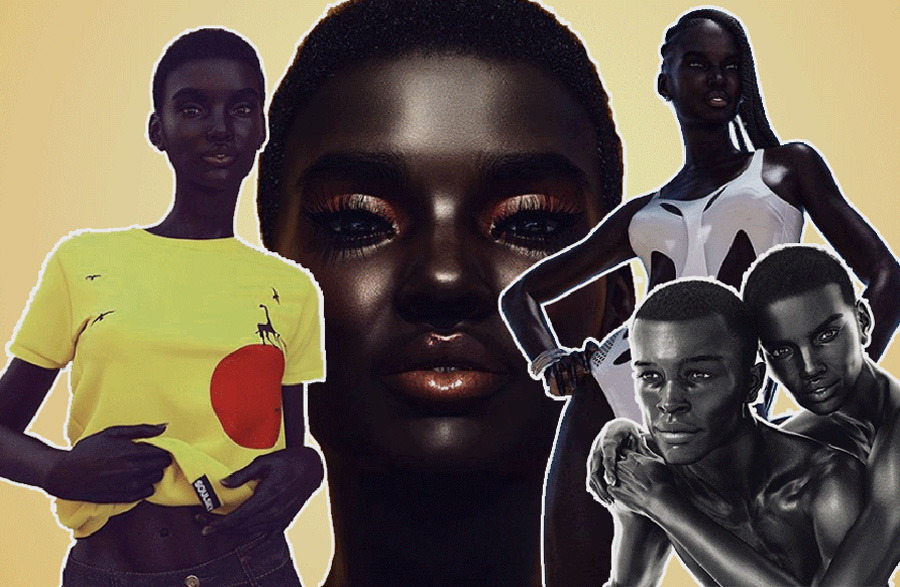
Not everything in social networks can be trusted. “Snapchata” filters and photo-editing applications based on artificial intelligence have long begun to blur the line between reality and fiction. And now the next step is outlined: fully virtual celebrities who bring very serious money to their creators.
One of the first was Hatsune Miku, whose “concerts” were attended by thousands of fans in Japan, and CDs with songs won first positions in the Japanese charts. But Hatsune was specially made unreal, “anime”, easily distinguishable from real people. New celebrities are not exactly like that. Many thousands of users are subscribed to their pages, like their photos and do not even suspect that they are fans of only 3D models. This is already a reality, more than that - perhaps this is our future.
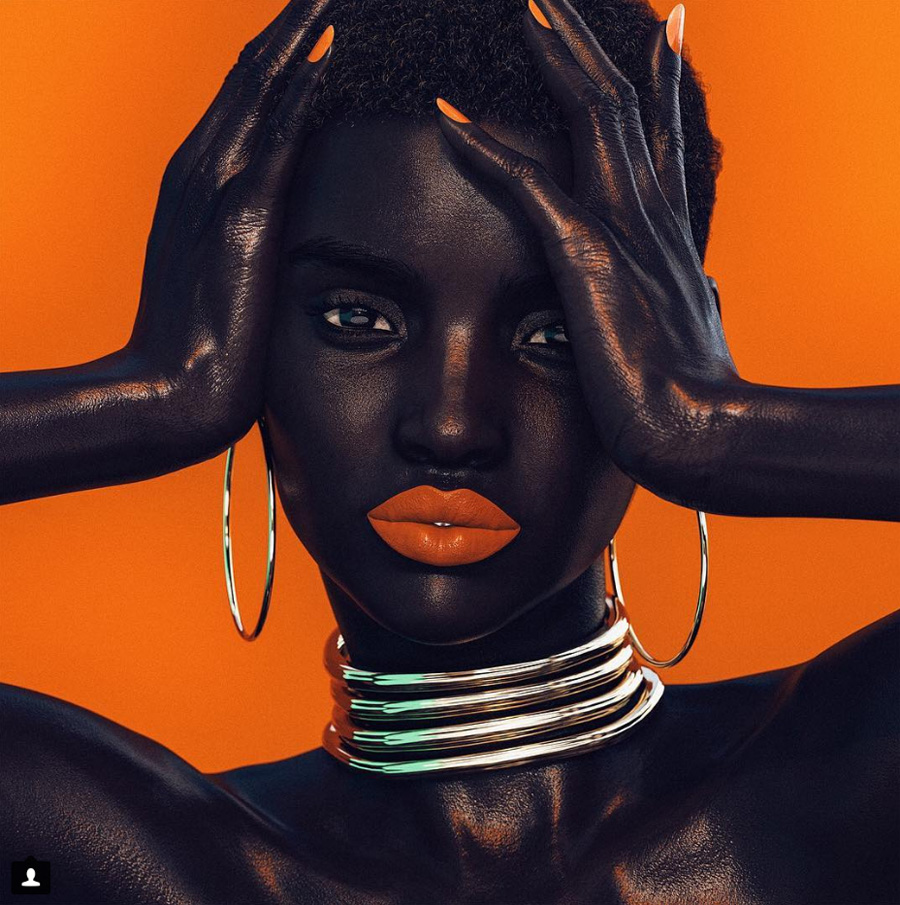
In April last year, one unknown instagram model suddenly became popular on the Internet. Perfect black skin, unusual features, long legs, slim and frail figure. Shuda , as she calls herself, in a few months gained 90 thousand subscribers (now there are already 140 thousand). Fatou Suri ( @theafrounicorn ), an emerging model from London, was among the first. She explains:
I am always looking for people who inspire me to subscribe to them. When I saw how beautiful she was, I was delighted. I began to communicate with her, she answered me. Stunningly beautiful, perfect both in terms of body and in terms of character.
The beauty (and growth of subscribers) Shudu noticed not only users. In February of this year, Fenty Beauty, a popular cosmetics brand owned by Rihanna, published on its page an image of a dark-skinned model with their orange lipstick. This post has become the most zalikannym in the history of the brand. Shudu began to make contracts with jewelry houses, photo studios and clothing brands. Journalists immediately began to look for a new Internet star. And then the truth came up: Shudu does not exist. This beautiful girl - the fruit of labor of British photographer James Wilson. The creator of the "world's first digital supermodel."
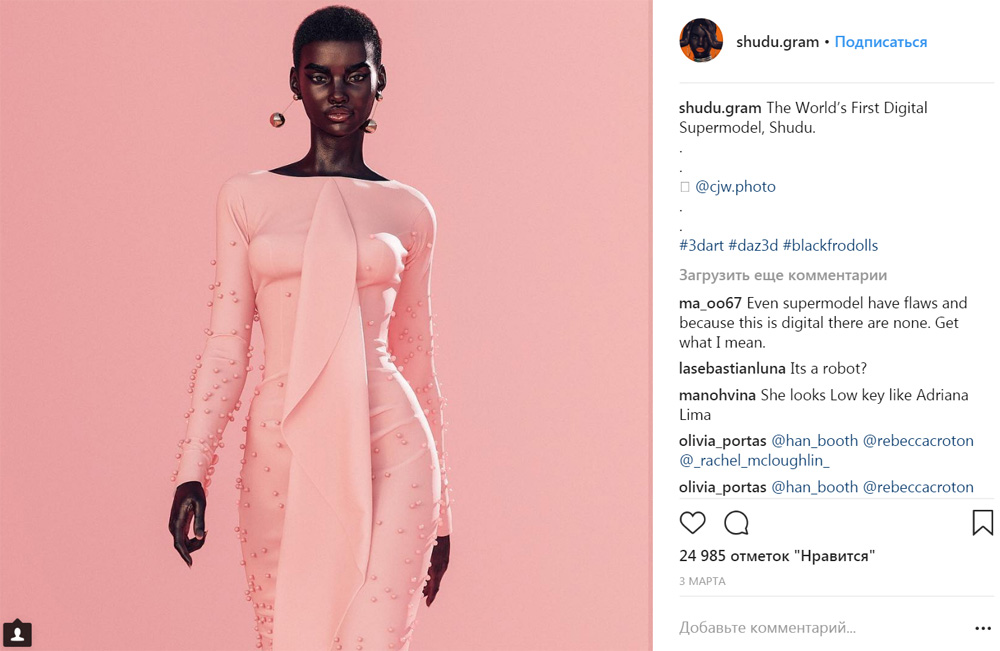
Wilson does not want to appear on camera. He is younger than thirty, worked as a self-taught photographer in the fashion industry for about ten years. He is interested in science fiction and the latest movies with CGI - from where the idea to create a fully digital instagram model appeared. For the basis, he took the Barbie doll " Princess of South Africa " and photographs of dark-skinned models Alec Vek and Daki Toth. About Ducky , by the way, they also say that she has a doll appearance, especially under cosmetics, that is why so many people believed in the reality of Shudu.
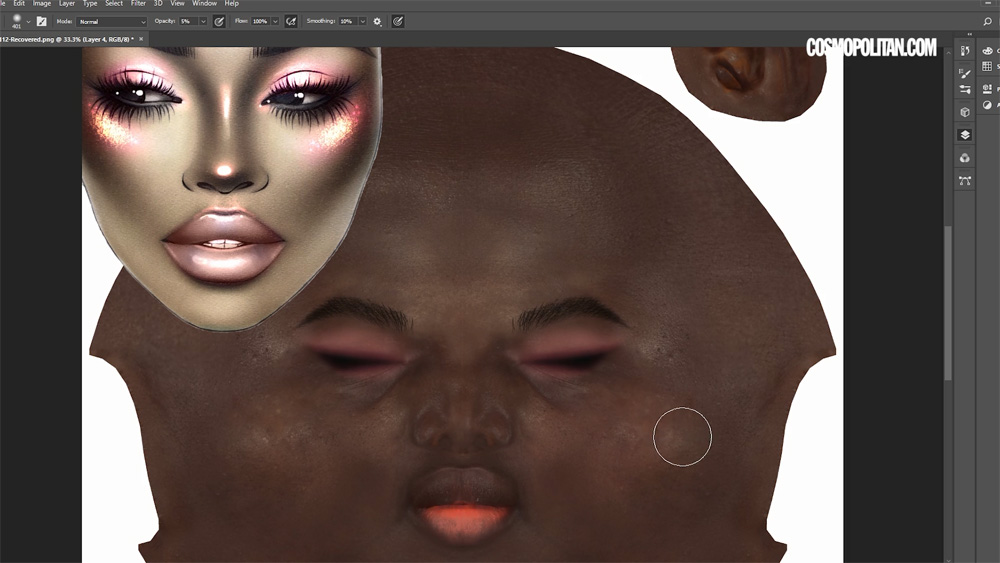
Shudu creation process
James Wilson says that he did not want to deceive users of the social network, it just happened. For him, Shuda is an “art project”, an attempt to create an ideal woman from his point of view. When it became unexpectedly popular, it became uncomfortable to pretend that all this was true. Then he gave an interview to journalists, at the same time showing the process of creating a “photo” of Shud, so that no one really had any doubts. He also designed his page so that everyone understood that this is a 3D model. To Wilson’s surprise, Shudu’s popularity was unaffected. She continues to gain subscribers, and companies continue to actively offer money for "cooperation", especially after dozens of magazines wrote about its history.
Now it is his main income. It takes him from three days to a week to create a picture with Shud. And for the “supermodel” to present their brand, firms pay him from a few thousand to a few tens of thousands of dollars.

Fatou Suri says she was shocked and disappointed when she found out the truth. But still it remained signed on Shuda - because these “photos” seem to her aesthetic. True, she stopped communicating with the star of the instagram: it is somehow strange when you understand that James responds to these messages. Now it seems that Suri is even better, that Shudu is just a figment of someone's imagination. "She is so perfect that I am even calmer that no one in reality exists."
Virtual life
In April 2018, celebrities Michela Souza’s Instagram account was hacked. Made it another celebrity - a mean competitor, Bermuda ! She deleted all posts Souza, exchanging them in the photo with a beloved. Souza's subscribers were shocked. “Leave her alone, what she did to you!”, “You're just jealous that Mikela is more beautiful than you!”.
But it turned out Bermuda had a motive. She wanted Michela to tell her followers the "truth." That was the only way she could get her account back. Michela was forced to agree, and a few days later she revealed herself to her users: she is not real. All her images are just a 3D model placed on different backgrounds. And Bermuda (and some other celebrities, such as the black-skinned Blavko ) is just the work of one company, Brud , from Los Angeles, who draws and spins them. The whole scandal between Michela and Bermuda was invented, so that their followers have a reason to look at the next account.
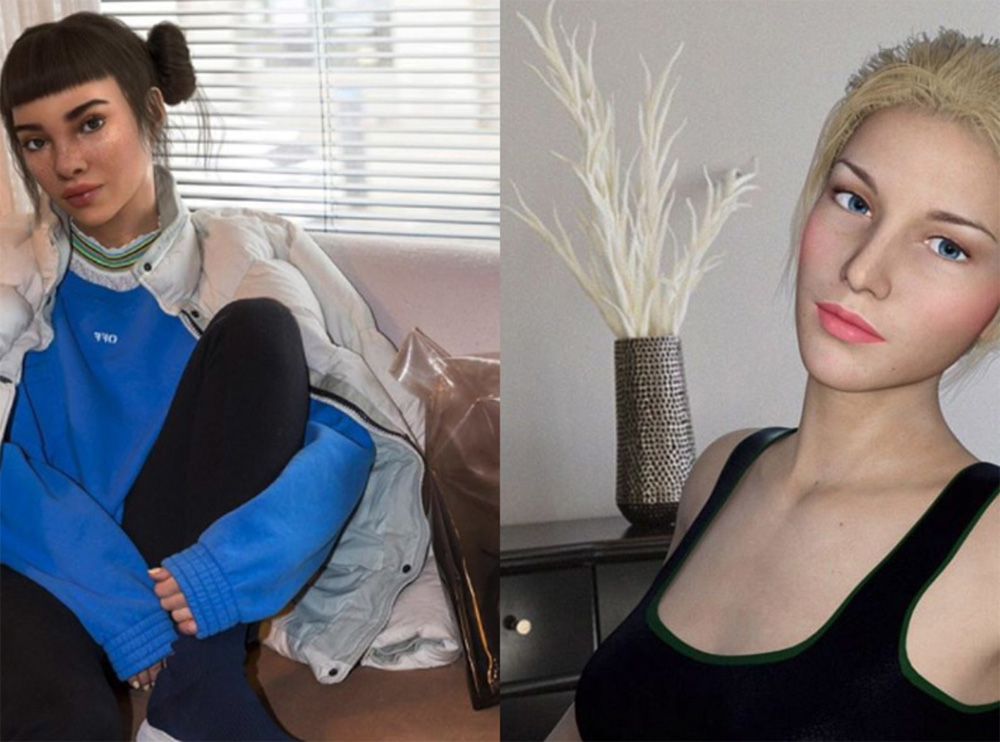
Michela and Bermuda
Shudu is the first virtual supermodel. Like Naomi Campbell, only so far on a smaller scale. Then Michela is like Kim Kardashian. Always in trend, in expensive clothes, with his “get-together”, with friends and foes. Something always happens with her life, and it is interesting for many (real) people to follow this.
The philosophical question arises: is it possible to seriously call a virtual character “celebrity”? It turns out - in a different way already. Michela Souza made her first post in April 2016. Now she has 1.3 million subscribers, and this summer Time magazine included her on his list of the Top 25 Most Influential People on the Internet. She began to record songs - her single Not Mine last year went to the top of Spotify. Michela uses his platform to support social movements, such as Black Lives Matter and Black Girls Code. And even (according to rumors) is in a relationship with an absolutely real person, the guitarist of the rock band Portugal, The Man . It is almost impossible to distinguish her activity from that which a real celebrity has.

Judging by the comments on the page of Michela, even now not all fans of the star know that it is painted. And this is despite the fact that the images of Michela are specially made slightly “plastic” (according to the creators, this is the form of its attractiveness, it shows “its character”). The opinion has spread that this is still a real girl, only with CGI “drawing” to make it even more spectacular on the surface. Brud doesn’t specifically debunk these theories.
When asked how she treats virtual stars, Michela answers in an interview:
It seems to me that almost all celebrities in our pop culture are virtual. They show one facade, only what we can see. But, as the same situation with our elections showed, the virtual becomes real over time. Therefore, I will use my platform only for positive.
For his followers, Michela is as real as any other model on the TV or from the Internet. But other instagrammers slightly in shock. Especially when they realize how much money this 3D-girl makes every month.
The ideal tool brands
The growth of online popularity of such models as Michela, Bermuda and Shuda is a real wet dream of marketers. These celebrities can be placed anywhere, in any clothes, any pose, and all in the same time and the same price. No need to make a photo session on the beach, do not worry about flights, do not order things for fitting. One 3D designer can do everything (or a small team) - it’s enough to give them their budget, which will always be lower than Heidi Klum.
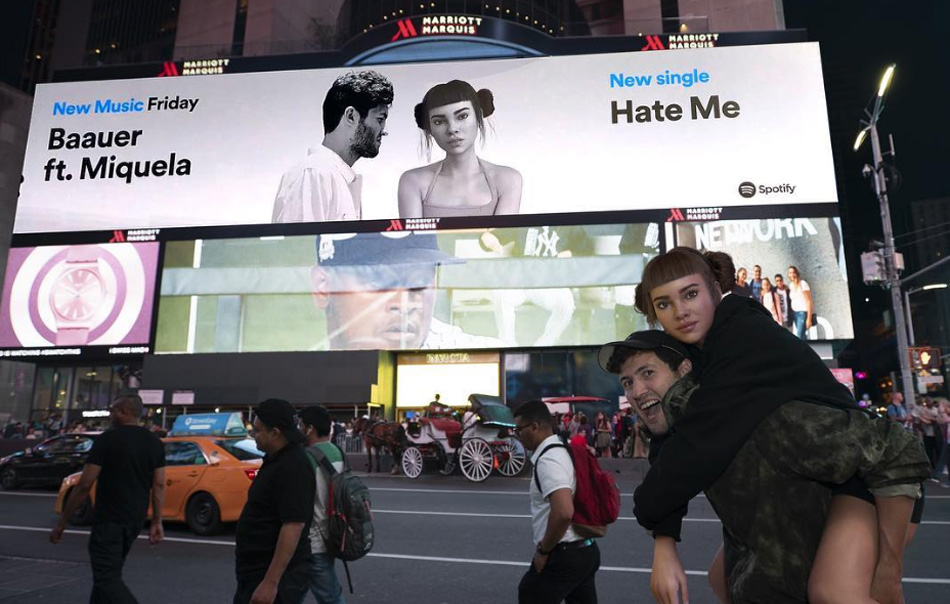
With virtual models there are no problems on the site. They have no days off, they do not age and can not wake up with a pimple on the forehead on the day of filming. Their hair, lips and nails can be repainted at least every hour. They are open to the use of tattoos. Any clothes sitting on them like poured - better than on any person. It is not surprising that 3D celebrities have no end of money companies.
Michela "wears" clothing Chanel, Supreme, Vans and Martin Margiela. Rides on Porche. He advertises the latest Hollywood films, "going" to them for premieres. Eats in fast food restaurants. Uses the Apple technique. And billboards with its impartial face are already hanging in the center of New York. She earns a few dozen times more than real instagram stars of the same magnitude. The bill goes to hundreds of thousands of dollars a month. And at the same time - the account is only two years old! Who knows what will happen in two more?
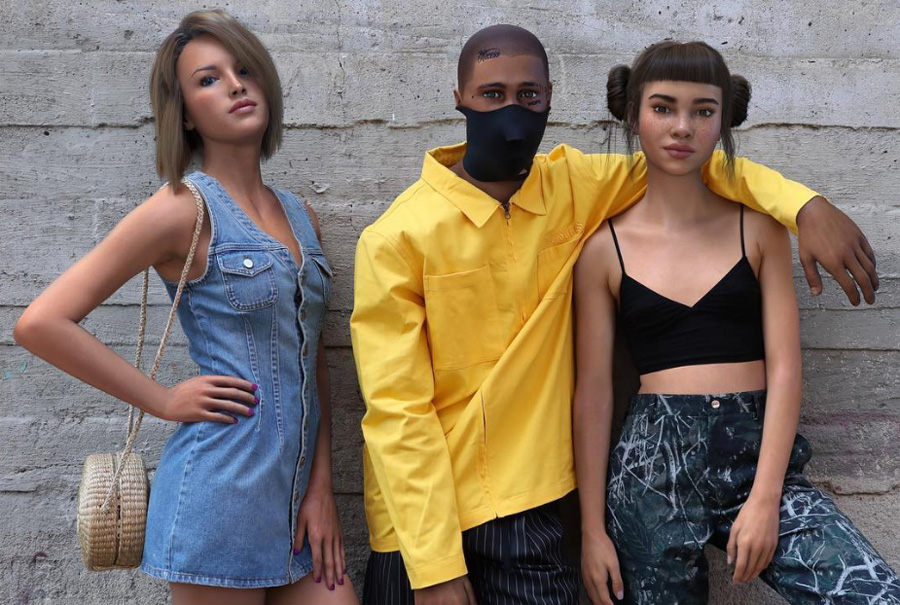
3D models look at you like a loser
Emerging markets are trying to master different companies. In April, launched the British firm Imraz Models, offering virtual models for brands. Its designers "will create a face that is ideal for your advertising campaign." The founder of the company, Philip Jay, a former photographer of Playboy magazine, says that, as a rule, brands require a specific model - with the features they need, figure, gender, race, hairstyle and hair color. His company will provide just such a one - at the right time, taking into account all the wishes of the client and without the need for casting.
Standards of beauty, or why we need to stop looking into the lives of others
In the movies and on the covers of magazines we are shown the most beautiful women. And well-made up, and now with abundant use of special programs that remove all the flaws on the skin, wrinkles and bags under the eyes (such technologies are used not only for photos, but also for movies - for some actresses they are directly prescribed in contracts so without them, they are not removed). Now, with the development of virtual models, the standard of beauty rises even higher. People create the character of their dreams, with an absolutely perfect face and figure. And ordinary users then, inevitably, compare themselves and those around them with this ideal.
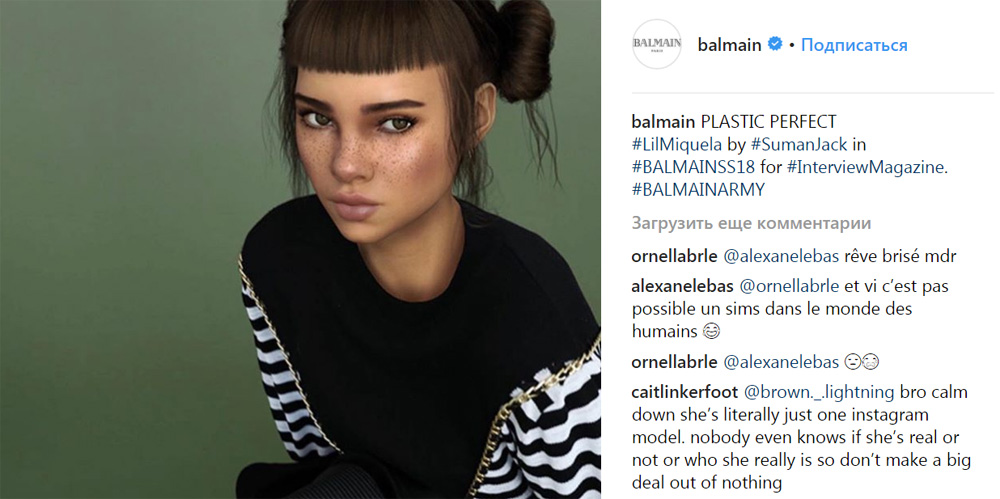
The result of non-compliance with their expectations - depression and suicidality, especially among adolescents. We live in the most successful time in the history of mankind, but the level of depression is growing at an unprecedented pace - especially in developed countries, with access to the Internet and social networks. In the US, 63% of adolescents (and 47% of millennials) are diagnosed with depression. Moreover, girls are exposed to this state 2 times more often than boys. Many in the States (you will not believe) continue to insist that video games are the cause of this development problem. But why then girls depression occurs much more often?
"Leader" in the level of suicide among developed countries - South Korea . The country with the largest number of plastic surgery clinics per capita. The country where the operation for the sake of increasing the eye, known as the " double eyelid " - the most common gift of their daughter's parents for graduation. Where millions of young people aspire to look like pop idols. And, of course, fail.
Of course, depression has a lot of other reasons - from stress due to studying to a bad atmosphere in the family. Some drugs, such as interferon and isotretinoin, drug use, genetic predisposition, personal or professional problems ... But the growing popularity of celebrities who seem real, only look much better than you and live inaccessible to you, is unlikely to help adolescents feel better.

Rene Engeln, a professor and psychologist at Northwestern University in Illinois, who studies our body perception, says that the entry of digital models into our lives can be a big problem:
This is terrible news for women's health and self-esteem. Girls will compare themselves, try to be like models that are literally not people. This is some kind of joke, and not very funny.
On the other hand, it is enough to watch the show “Voice” or American Idol to understand that the production of celebrities has long been put on the conveyor. New instagram models just go one step further. They are one step "fake" real instagram- "stars", fasting pictures of their priests to millions of fans.
And yes, here is another industry in which robots, as it turned out, can do work no worse than humans.
PS We deliver goods from US stores, from $ 8.99 per pound. According to the HABR code , $ 7 is given to all readers after registration . And now we have a cool school action : another 10% for 16 stores until September 16. Our operators will redeem for free and issue the goods, so if this is your first delivery, you don’t have to do anything extra, you just need to give us a link.
